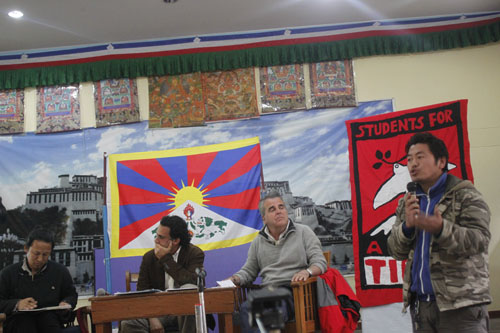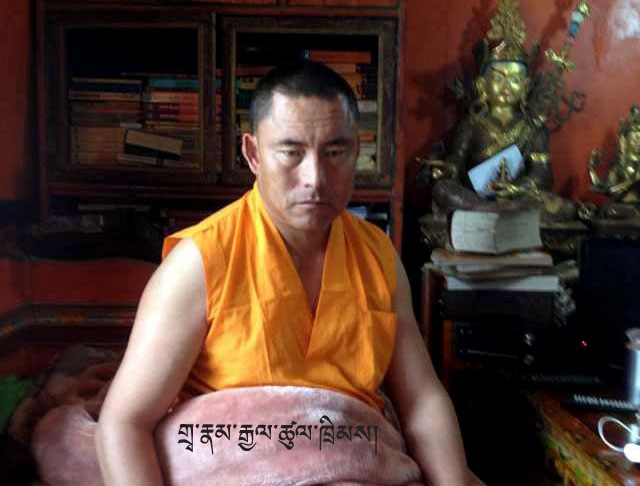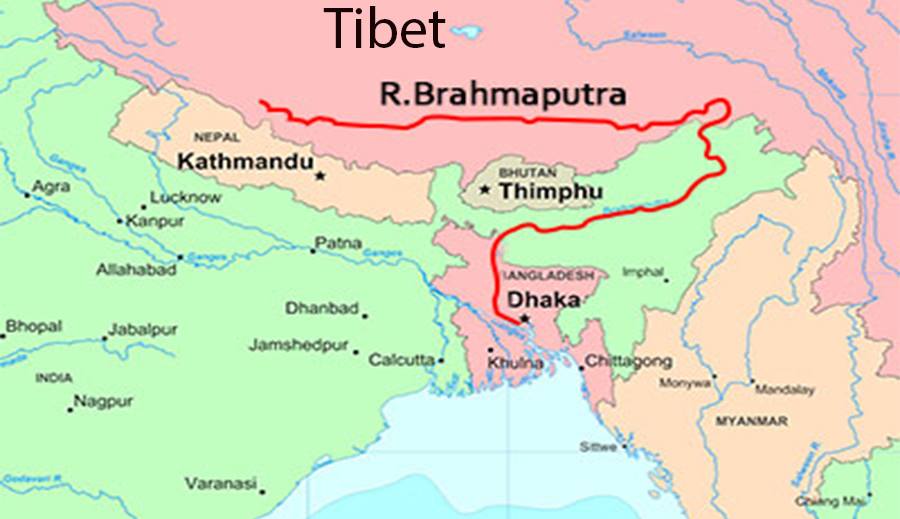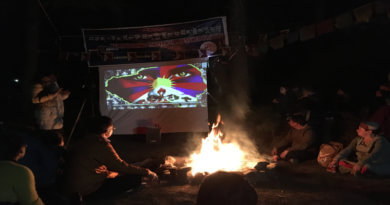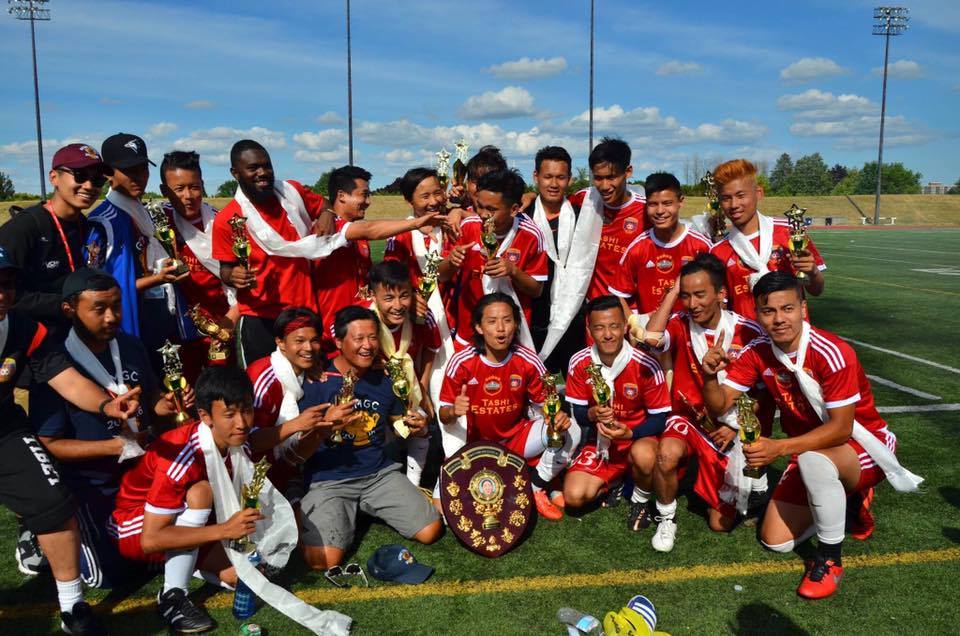Talk and discussion on landmark Spanish lawsuit on genocide and crimes against humanity in Tibet held in Dharamsala
DHARAMSALA, Mar 17: Exiled Tibetans and Tibet supporters gathered at the TCV Day School here in Mcleod Ganj, Dharamsala on Feb 14 for a public talk on the landmark law suit filed in the Spanish National Court which led to arrest warrants being issued against five former Chinese leaders, including a former Chinese President and a Premier for crimes committed against humanity and genocide in Tibet.
In 2013, Spanish judge High Court Judge Ismael Moreno issued arrest warrants and directed the Interpol to detain former Chinese President Jiang Zemin, former Prime Minister, Li Peng and three other senior officials. Unfortunately, the Spanish Parliament under pressure from China, voted on legal reform that effectively shut down the cases.
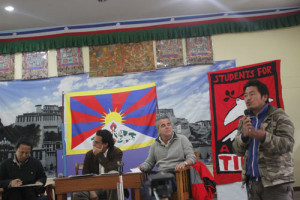
The speakers, Alan Cantos, Director of Comite de Apoyo al Tibet (CAT) and Jose Elias Esteve Molto, international lawyer and legal scholar, who were instrumental in getting the Spanish National Court to issue international arrest warrants against former Chinese leaders using international law and universal jurisdiction, spoke about their experience and how the events unfolded.
Alan Cantos spoke on the significance of the cases and why the democratic countries need to stand up against China and avoid doing business with China if justice is denied.
“We believe that this legal fight is pure satyagraha, this is what we really think and it is based on truth…on peaceful not vengeful way of resolving conflicts and it is an act of active resistance. The Dalai Lama had often spoken about the importance of accountability in the Tibet struggle and we think this is a step forward for bringing some accountability even though international law is not perfect. It is better than oblivion,” Allan said and continued, “So what we are trying to do is symbolically or not symbolically say no to China and something like no justice, no business. This is important. Business continues as if nothing happened but they use it as an excuse and we somehow have to stop that. In that respect, we think that Tibet is the tip of a huge iceberg of democratic submission of democratic countries and their principles. Tibet represents failure of modern democracies to stand up for their principles. So it’s not only Tibet that loses, we all lose by not learning to say no to China and if we are not careful, we will become the ‘United States of China’.”
Alan also noted that through the cases, they intend to inspire others to follow suit and spoke on the significance of self-determination to voice one’s opinion and on the need for a ‘Tibetan Commission for Truth and Reconciliation’ to be established.
“The other thing that we are trying to do is inspire other countries, other lawyers, other scholars to do similar thing in their national courts, since in Spain, we are being limited. And we also want to bring the concept of self determination which is a legal United Nations’ recognized method that allows each voice to be heard and avoids the use and sterile controversies and confrontation of Rangzen Vs Middle Way. I think it’s good but we keep the unity. Self-determination represents freedom of choice and unity with diverse opinions which is the basis of true democracies. We have examples in East Timor, Scotland and Catalonia in Spain,” he said.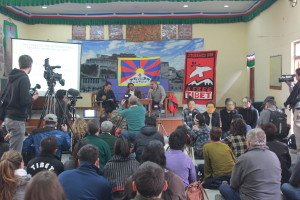
“The other thing we could discuss and explain a bit better is the necessity for a ‘Tibetan Commission for Truth and Reconciliation’. This is part of the legal process in countries that have suffered trauma, civil war, transition from dictatorship to democracy and it helps record the feelings and the facts of the victims, of the families and whoever has suffered and also allows to pacify the society and it also allows to record what has happened..it allows to record the truth in a systematic way for archive, for historic and for legal reasons. And it also allows countries to enforce measures that heal the wounds and repair the hurt of the victims. And I think that this is an important thing that could be done,” he added.
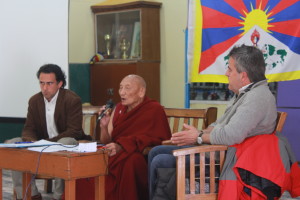
Lastly, he said that despite the Spanish Parliament voting against carrying out investigations under the law of universal jurisdiction, they will never give up and expressed that the courage of the Tibetan victims who had spent lengthy jail terms and testified in the Spanish courts inspire him to continue his work.
“I want to say that our work is inspired by people like Palden Gyatso, Tanak Jigme Sangpo, Bhadro, Ngawang Sangdrol, the Drapchi nuns and all the thousands of other victims and their families. The rest, really is noise and we try to stay away from the noise to keep the legal course and try to stay away from the political and the economic noise. Our work is dedicated to them and their example of courage. It’s actually for all the Tibetan people and we will never give up,” he said.
Jose Elias Esteve Molto spoke on the technicalities of the legal cases, earlier cases filed under the law of universal jurisdiction, the challenges they faced while fighting cases, how China pressured the Spanish Parliament to vote against the application of universal jurisdiction.
“Well these legal cases that were prepared and are still under appeal before the Spanish courts in Spain claims that international crimes committed in Tibet, namely genocide, torture, crimes against humanity began in 1950s and continued to this day without a single person ever having being held accountable for their actions and furthermore, the cases successfully claim that Spain has jurisdiction to investigate and prosecute crimes committed far away from Spain on the Tibetan plateau by Chinese officials,” he said and added, “Universal jurisdiction law in Spain establishes that Spanish judges have the competence to try international crimes regardless of where the crime was committed or the nationality of the victims or the accused.”
Jose said the principle of universal jurisdiction was first put into practice in Spain in 1996 when a legal case was filed in the Spanish courts against Augusto Pinochet, former dictator of Chile for identical international crimes committed not only against Spanish nationals but all the victims regardless of their nationalities that led to Pinochet’s arrest in London in October 1998 following an arrest warrant issued by Judge Baltasar Garzón.
Despite Chinese protests calling the cases, an interference in China’s internal matters and questioning the behaviour of Spanish judiciary, in October 2013, the Spanish National Court agreed to indict former Chinese President Hu Jintao for genocide. Few weeks later, after China has been under scrutiny for Universal Periodical Review, another judgement arrived from the same court. The Spanish judges ordered international arrest warrants to be issued against five Chinese leaders, including former Chinese president, Jiang Zemin and former Prime Minister, Li peng.
“The impact of the National Court’s ruling in the judiciary and the media sparked immediate Chinese diplomatic reaction which had its repercussions on Spain’s democracy. This time China did not limit itself to expressing its strong displeasure or calling the arrest warrants shameful. Zhu Weiqun, the president of the Chinese Religious and Ethnic Affairs in China declared, referring to the Spanish judges, ‘let them go ahead if they dare’,” Jose said and added that the Chinese pressure continued for months and the Spanish parliament finally voted against application of the universal jurisdiction against Chinese leaders.
Alan and Jose then took questions from the audience and two former Tibetan political prisoners, Ven Palden Gyatso and Ven Bhagdro who had testified in the Spanish courts spoke about their experience.
To a question from the audience regarding what will be their next move since the arrest warrants have been rendered null and void by the Spanish Parliament, they said that the cases are still under appeal in the Supreme Court in Spain and with a change in the political climate in Spain, the arrest warrants could still be revoked if the Spanish Parliament, in future voted in favour of the judgements.
The event was jointly organized by Students for a Free Tibet-India and International Tibet Network.

